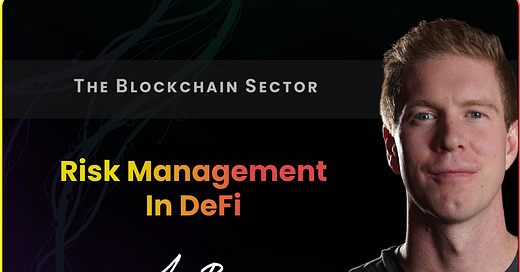The Blockchain Sector provides information relating to emerging financial technologies. It should not be considered financial advice. Disclaimer below.
Every time you invest in a DeFi protocol or interact with an external smart contract you are taking on some risk. There are multiple layers of risk with every transaction, liquidity provision or investment.
There is the potential for smart contract vulnerabilities which can lead to loss of funds within a smart contracts and collapse of the protocols themselves
Potential for malware on the device that you use to manipulate the transactions that you're signing and steal funds and tokenized assets
There is the unfortunate possibility that founders carry out a rug pull and disappear draining the funds within the protocol itself to their personal wallets
Then there are market risks that the things you're investing in just aren't successful
If we look at startups there are plenty of stats that suggest 80%+ of startups aren't successful and never find product market fit. I would estimate that figure is even higher for DeFi protocols and projects launched in the blockchain sector.

Coinmarketcap has over 20,000 assets listed of which maybe only a hundred or less have real traction in the space and are being used in any meaningful way by users. That would put your chances of selecting one of these projects using random allocation at less than 1% percent.
Quantifying all these risks is difficult and even with a good understanding of Solidity I can’t accurately estimate the chance of smart contract vulnerabilities or a protocol level hack.
The closest systems I have are based more on the Lindy effect (things that have been around a while are likely to stick around). If a protocol has a billion dollars in TVL for more than a year, the best hackers in the world will have probed it and it's less likely to be vulnerable.
This is less useful for newly released projects which is where the highest potential upside lies for investors. With these projects it can be extremely difficult to assign any reliable risk metric to your investment philosophy.
I worked sometime ago on a DeFI risk framework, which I've linked to here:
This is an attempt to systemize part of my risk analysis when looking at a new project from an investment perspective. It is by no means a definitive system that everyone should be using. For me it's a good framework to check the low hanging fruit and come up with a rough idea of how to price in the risk of an investment.
For new investors to the space there are two very valuable tools you have at your disposal.
The first is diversification. By distributing your funds across multiple subsectors of the blockchain industry you can lower the risk to your portfolio if one of these projects goes wrong.
The second is dollar cost averaging. New investments can be bought over a longer period of time. If price goes up during that period then the position has appreciated and if price goes down the investor is getting later orders at a lower price and ultimately a lower entry point. The idea is to end up with a time weighted average price for the asset that you were buying into over a set period.
So many speculators buy Bitcoin during a peak bull run where everyone is talking about crypto and there is a lot of focus on the industry. Then they getting disheartened, lose interest when the stack of cards comes crashing down and we get about bear market which resets the sentiment
This creates an effect where new market participants are often buying high and selling low.
With DeFi specifically I believe there's value in accepting risk and making well qualified judgements on projects and protocols where there is potential to outperform the market.
If a protocol really has a strong chance of outperforming Bitcoin or a staked Ethereum position over the period of time perhaps it's worth the additional risk that comes with a lower market cap cryptocurrency.
Social links are below and if you enjoyed this piece I would appreciate it if you could share this content around social media.
Disclaimer: Not a financial advisor, not financial advice. The content I create is to document my journey and for educational and entertainment purposes only. It is not under any circumstances investment advice. I am not an investment or trading professional and am learning myself while still making plenty of mistakes along the way. Any code published is experimental and not production ready to be used for financial transactions. Do your own research and do not play with funds you do not want to lose.





